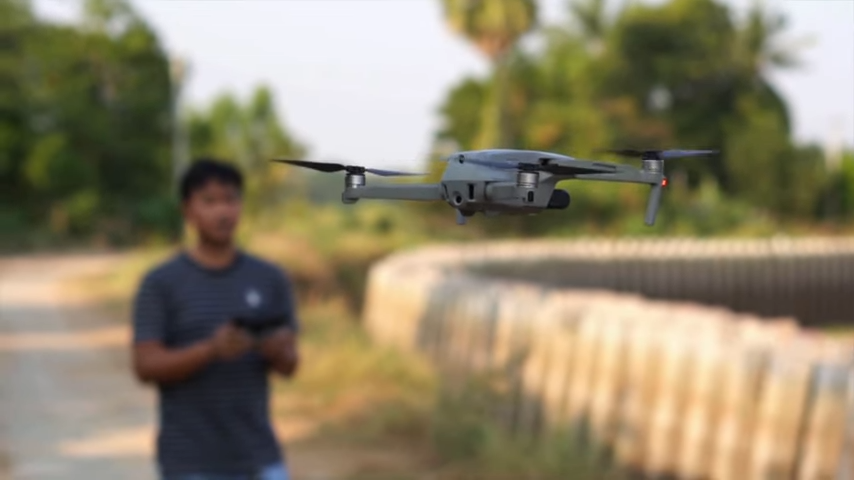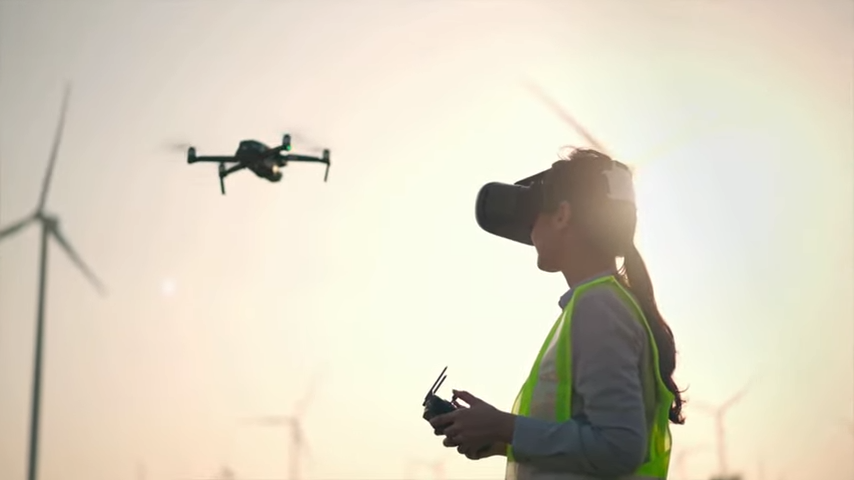The use of drones has significantly increased in the recent past from recreation to commercial sectors. Nowadays, there are several rules and regulations that govern drone ownership and operation, depending on where you live, for security and privacy reasons. Therefore, before flying your device, you should take your time to learn about them. One of the things that you should find out is if you can fly a drone over private property.
This article provides all the information you need to know about flying drones over private properties in different areas and the legal actions you may face. Let’s dive right in!
At the moment, there are no federal regulations prohibiting flying a drone over private property in the US. According to the law, the air space doesn’t belong to property owners, meaning you can fly your drone whenever you want. However, there is a certain height that you can’t go beyond.

When flying your drone over private property, you need to be mindful to maintain a good relationship with your neighbors. Avoid flying recklessly or causing a nuisance. According to reviewers, the DJI Mini SE is a great option for those who want to maintain a good relationship with their neighbors since it’s small and barely noticeable while it is in the air. Also, weighing in at just 249 grams, it should prove easy to transport to and from your home.
Although most states in the US don’t have a problem with people flying drones over private property, some don’t allow it. Therefore, before flying your drone, you should check your state’s rules and regulations to avoid getting in trouble with the authorities.
Different states in the US have different rules concerning flying drones over private property. Let’s look at the regulations in some of the states.
Most people often ask if you can fly a drone over private property in California. The short answer to this question is no. According to the California State Assembly regulation, flying your drone 25 feet or more outside your visual range on another person’s private property is illegal and considered trespassing.
Certain laws also differ within California state. The city of
Calabasas
Trusted Source
Drones and Unmanned Aircraft Systems
The purpose of this chapter is to regulate the operation of Unmanned Aircraft,
commonly known as drones, which can at times pose a hazard to full-scale
aircraft in flight and to persons on the ground.
www.cityofcalabasas.com
, for instance, will allow you to fly the drone over another person’s private property if you obtain consent.
Although trespassing is not an indictable crime, the police may ask you to pay a $1000 fine which can significantly dent your pocket. If you can’t pay the fine, you may serve a sentence of up to six months in a county jail.
According to Texas state drone laws, you’re not allowed to fly your drone over private property. If the owner finds you, they may report you to the authorities, and you may get charged with illegal surveillance and trespassing.
No. You’re not allowed to fly a drone over private property in Georgia since doing so would violate the owners’ right to privacy. According to Georgia state law, using a drone over a person’s property is illegal, and you may get charged with trespassing.
Oregon law prohibits anybody from repeatedly flying a drone over private property, provided the owner has notified you once.
Going against the owner’s wish may make you face legal action. If they successfully pursue a claim, you may have to pay them treble damages and compensate them for the attorneys’ expenses. Nevertheless, the property owner has no legal recourse if the drone is legally in the flight path of an airport or runway, taking off or landing.
According to Florida state laws, flying a drone between 0 and 500 feet above private property without the owner’s consent is unlawful.
The Michigan state drone laws allow residents to fly drones over private property. For instance, however, you should maintain at least a tree line’s height. Otherwise, the property owner may sue you for trespassing and breach of privacy since property owners have the right to use the airspace above their properties.
Yes, you’re allowed to fly a drone over private property in Ohio. However, you should maintain a tree line’s height, just like in Michigan.
In a state where you’re not allowed to fly a drone over private property, your neighbor may file a civil or criminal complaint and sue you for the following:
On the other hand, if your state laws allow you to fly your drone over private property, there’s nothing much your neighbor can do. However, they have the right to sue you if you fly the drone too close to their house. Generally, the drone should always be above the treetop height.

If the judge finds you guilty, you’ll be penalized according to the laws in your state. Often you’re required to pay a fine Trusted Source Paying a court fine - Citizens Advice What happens if you don’t pay a court fine in time, including how to ask for more time to pay, and what to do if you can’t afford to pay www.citizensadvice.org.uk , although in some cases, you may be sentenced to prison. In some cases, the authorities may confiscate your drone depending on the severity of your case. To avoid these issues, go through your state’s law concerning flying drones over private property.
UK drone laws Trusted Source Lancashire Constabulary - Drone law in the UK Drones or unmanned aerial vehicles (UAV) are simply machines that are remotely controlled by a person on the ground. They were once exclusively used by the military when it deemed too dangerous to send a manned aircraft. www.lancashire.police.uk also don’t allow you to fly a drone over other people’s private property, although you can fly it in your own backyard. Naturally, there are rules for this as well.
One of the essential things is that your device should be under 55 lbs. Also, you should keep it below 400 ft in altitude and within 1640 feet horizontally. Furthermore, your drone also needs to be at least 165 feet away from the property always. If you’re using a camera and are within recording range of your neighbor’s house or garden, you may be breaking the data protection laws, and they may sue you. Most importantly, ask for your neighbor’s permission so they’re aware that you’re using a drone on their property.
All countries have different laws concerning flying drones over private property. According to Canada’s national aviation authority, flying your drone over private property is completely fine. Canadian laws state that property owners only have legal rights to the land, but the air space belongs to a different jurisdiction. Therefore, anyone can use it in whatever way they want.
For instance, insurance companies can freely use drones to analyze the condition of their clients’ roofs. If you find yourself in need of something similar, our list of the best drones for roof inspection can help you find the best quality drones for the job.
Even if you’re allowed to fly your drone over private property, you should be considerate of your neighbors and avoid interfering with their rights for peaceful coexistence. Limit the time the device flies over the area and control the noise it produces during the process. Additionally, fly the device where you can always see it to avoid causing accidents and ensure it doesn’t go beyond 400 feet. Finally, you should avoid invading their privacy.
Most modern drones, including those that cost less than $150, have cameras that can take photos of your property. As such, if you’re looking for a decent drone with video and photo capabilities for cheap, reviewers recommend the Hiturbo Drone, given its FPV capabilities and 1080P video output. Alternatively, you can peruse our list of the best drones under $600 if the Hiturbo drone doesn’t strike your fancy.
Such drones can capture a video of what’s happening in your home, invading your privacy. Moreover, drones may put your security at risk.
The best way to handle this issue is to file a complaint stating that the drone is interfering with your privacy. When you decide to use this method, you should be careful. Ensure you provide sufficient evidence to show that the drone is invading your privacy. There are several laws governing drones and privacy. If the evidence convinces the judge, they may grant a restraining order, preventing the drone operator from flying the device over your property.
You can also file a trespassing complaint when a drone flies too close to your property’s boundary. Unfortunately, most laws don’t specify how much of the area above your land is included in the property’s boundaries.
Some drones produce a lot of noise when flying, which can be a nuisance when relaxing after a long day at work or when sleeping at night. Loud drone noise can also make it difficult to concentrate, especially if you’re working from home or studying for upcoming exams. In this case, you can sue the drone operator for causing a disturbance. Ensure you record the noise using your phone and present it to the judge as evidence. You can also ask other neighbors to act as witnesses or file a class action suit to strengthen the case, especially if the noise also affects them. A strong case will make the judge order the drone operator to stop flying the drone in the neighborhood.
On the other hand, the smaller the drone, the quieter it is, and if you’re a drone operator looking for a drone that won’t cause noise pollution, our list of the best drones under $150 should provide you with some suitable options.
Most countries prohibit police officers from flying drones over private property, especially when trying to obtain evidence to use against a person in court. If they do so, the property owner may claim that the police were interfering with their privacy and sue them in return. Also, evidence obtained through drone surveillance may be inadmissible in a court of law, no matter how strong it is.
Each country and state has different rules governing the flight of drones over private property. In some places, flying a drone over private is legal, while in some, it’s not due to security and privacy concerns. Therefore, it’s advisable to do your homework well to avoid problems. If you’re wondering where you can fly a drone over private property, go through our article for more information.